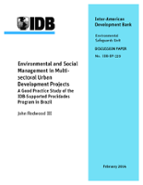Environmental and Social Management in Multisectoral Urban Development Projects: A Good Practice Study of the IDB-Supported Procidades Program in Brazil
Date
Feb 2014
Over the past several decades, the Inter-American Development Bank (hereafter "the Bank") has gained considerable experience with regard to the promotion of urban development in Brazil through multi-sectoral and global multiple works projects at the municipal level. This has also entailed a valuable learning process with respect to the challenges in environmental and social planning and management associated with urban development in the country. As a result, much of what the Bank is currently doing in connection with its extensive urban development portfolio in Brazil can be characterized as good practice. This is particularly the case in terms of its reliance on strategic planning at the local level and in the ways in which environmental and social considerations and components have been integrated - or "mainstreamed" - into project and design and implementation. Based on a review of pertinent documents, interviews with Bank staff and selected borrowers, and field visits to one completed and two advanced active Procidades projects in the states of Parana and Mato Grosso do Sul in February 2013, the purpose of this paper is to summarize these features of the Bank's approach to urban development in Brazil, to briefly describe how this approach has evolved over time and to identify a few areas where possible improvements might be useful.



